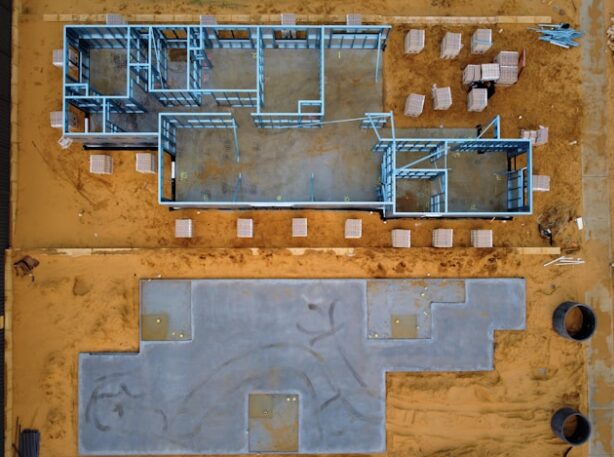Steel frame buildings have gained popularity across residential, commercial, and industrial construction projects for their strength, durability, and efficiency. Whether it’s a warehouse, agricultural structure, retail outlet, or custom home, steel frame buildings offer exceptional value. However, one of the most critical decisions you’ll make in the construction process is choosing the right steel frame building contractor.
The success of your project depends not just on the materials or design, but on the expertise and reliability of the contractor you hire. With numerous companies claiming to offer the best services, how can you separate skilled professionals from the rest?
This guide will walk you through the essential things to consider when hiring a steel frame building contractor, ensuring your project is delivered on time, within budget, and up to standard.
1. Experience and Specialization
The first thing to assess is the contractor’s experience, especially in steel frame construction. While many general contractors may claim they can handle any type of building project, steel frame buildings require specialized knowledge—from working with pre-engineered components to understanding load distribution and local code compliance.
Ask potential contractors:
- How many steel frame projects have they completed?
- What types of buildings have they constructed (residential, commercial, industrial)?
- Do they specialize solely in steel frame construction or is it just one of many services?
Choosing a contractor with a solid track record in steel frame buildings increases the likelihood of a smooth, successful project.
2. Licensing and Insurance
A reputable steel frame building contractor should have all necessary licenses to operate in your state or region. Licensing ensures that the contractor meets the basic qualifications, has passed required exams, and adheres to local construction laws.
Equally important is insurance. Contractors should carry:
- General liability insurance: Covers property damage or accidents during construction.
- Workers’ compensation insurance: Protects you from liability in case of worker injuries on your property.
- Builder’s risk insurance (optional but ideal): Covers losses due to vandalism, fire, or weather during construction.
Always ask for proof of licenses and insurance before signing any contract.
3. Reputation and References
A contractor’s reputation can tell you more about their professionalism, reliability, and quality of work than any brochure or sales pitch.
Here’s how to evaluate it:
- Check online reviews on platforms like Google, Yelp, and construction forums.
- Ask for client references and speak directly with past customers about their experience.
- Look for repeat clients: Repeat business is often a strong indicator of trust and satisfaction.
You can also ask local suppliers or industry professionals for recommendations or warnings.
4. Portfolio of Past Projects
A contractor’s previous work is the best reflection of what they can deliver. Reviewing a portfolio gives you insight into their capabilities, design style, and consistency.
When reviewing past projects, ask:
- Are the structures similar in scale and design to what you’re planning?
- Are there any custom design features or challenges they successfully managed?
- What building materials and systems were used?
Photos, site visits, or case studies can give you an idea of craftsmanship and attention to detail.
5. Understanding of Local Building Codes
Steel frame buildings must comply with local, regional, and national building codes. These codes cover everything from structural integrity and fire resistance to energy efficiency and wind loads.
An experienced contractor will be well-versed in:
- Zoning regulations
- Permit processes
- Code requirements related to steel construction
Contractors who fail to follow these codes may expose you to fines, rework, or safety issues down the line. Make sure your contractor has local knowledge and can manage all necessary approvals and inspections.
6. Project Timeline and Scheduling
Construction delays can be costly and frustrating. While unforeseen issues can occur, a professional contractor should be able to provide a realistic timeline and stick to it.
Discuss the following with potential contractors:
- Estimated start and completion dates
- Milestones and progress updates
- Availability of labor and materials
- Their current workload and whether they can prioritize your project
Clear scheduling helps you plan financing, occupancy, and other project milestones with confidence.
7. Transparent Pricing and Detailed Quotes
Avoid vague or incomplete estimates. A reliable contractor will provide a detailed quote that includes:
- Cost of materials
- Labor charges
- Permitting fees
- Contingency amounts
- Payment schedule
Ask for a written proposal that breaks down the costs. Also, clarify what is included and what is considered an extra. Transparency ensures you stay within budget and avoid surprise expenses.
Additionally, compare quotes from at least three steel frame contractors to evaluate fair pricing and scope of work.
8. Subcontractors and Team Management
Many contractors hire subcontractors for parts of the project such as electrical, plumbing, or roofing. It’s important to know:
- Who will be working on your site?
- Are subcontractors experienced and insured?
- How will the general contractor manage their performance?
Having a clear understanding of the team dynamics and project oversight ensures quality control throughout the construction process.
9. Communication and Project Management Tools
Open and consistent communication is crucial for any construction project. Choose a contractor who:
- Responds promptly to calls or emails
- Provides regular updates
- Uses project management software to track progress
You want a contractor who listens to your concerns, explains technical aspects clearly, and collaborates effectively with architects, engineers, and vendors.
10. Warranty and Post-Completion Support
Even after the building is complete, your contractor’s responsibility isn’t over. Ask about:
- Warranty periods for both materials and workmanship
- Response time for issues post-handover
- Maintenance support or recommendations
A contractor who offers a comprehensive warranty demonstrates confidence in their work and a commitment to client satisfaction.
Final Thoughts
Choosing the right steel frame building contractor isn’t just about price—it’s about experience, reliability, communication, and trust. With the rise in demand for steel buildings, many firms are jumping on the trend without the necessary expertise. Take your time to evaluate your options carefully.
Hiring a qualified contractor ensures your steel building will be structurally sound, aesthetically pleasing, and built to last. Don’t rush the decision. Vet your contractor thoroughly, ask the right questions, and always review contracts and terms in detail.
When you choose a contractor who understands steel construction and aligns with your vision, your project is much more likely to be a long-term success.



































